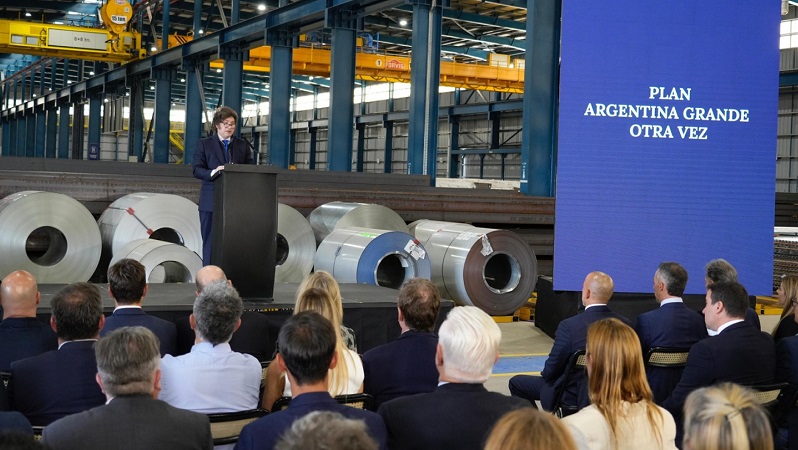
Javier Milei put on an event in Pagea metallurgical company located in Saint Nicholasprovince of Buenos Aires. Before an audience of businessmen, he was accompanied Karina Mileithe minister Federico Sturzenegger and by the mayor Santiago Passaglia -as an attempt to reverse the poor electoral performance in the northern part of the province. At the same time, social movements and residents of the area set up an escrache at the California neighborhood collector, with the slogan of “3% for Karina” which is already a classic.
The speech was made inside the plant, surrounded by gendarmerie and security. And with the already worn-out slogan of Trumpism: Argentina great again. The main topic was labor and tax reforms, along with an announcement of trade liberalization to “open the doors to the entry of goods and services from around the world.”
Speaking about a country of wonders, the president stated that “to support this process of unprecedented growth in our history,” he will promote the voting of these projects in Congress, until after the elections. Reality shows another Argentina: recession, fall in consumption, loss of formal jobs, stagnant salaries and a new debt with the United States that comes to cushion an economy at the service of financial scams. But for Milei, “The macro sector is going strong and reforms are urgently needed to boost the micro sector.“.
Regarding the labor reform, he mentioned that they want to go over the collective labor agreements to “adapt” the contracts to “the current productive and labor reality.” And he criticized the “structures in place for 70 years,” which are nothing more nor less than the product of decades of struggles of working people to wrest rights from employers in Argentina. He also stated “renew the profit regime“, within the proposals of Tax Reform.
The president showed the reform as a benefit for large companies that adhere to RIGI. And also for SMEs who, in his opinion, are besieged by “caranchos”: it was his way of referring to the judicialization of claims for labor rights made by hundreds of thousands of workers, as a way of protecting themselves against informality. He also spoke of advancing labor justice itself, of “eliminating discretion,” to protect workers from labor laws.
If these reforms are applied, workers will be the only ones affected for the benefit of companies. Perhaps that’s why the president looked for a nice quip: he promised that 100% of the salary could be “paid in dollars.” But so far in his management with the minister Luis Caputothe government only managed to empty Argentina’s reserves again and again: dollarization is a libertarian tale.
In turn, the president proposed “greater freedoms when agreeing to contracts.” This, According to the proposals of Mieli and the International Monetary Fund, it has to do with employers having greater freedom when imposing their working conditions. The intention to make working hours more flexible and longer appeared with the old proposal of “a bank of hours”, linked to seasonal work.
Even so, it is a weakened government, hit by corruption scandals, by the theft of Karina Milei in the Disability box, due to the relationships of the José Luis Espert with the drug trafficker Machado. Where could the government get the strength or legitimacy to impose these reforms?
Milei showed a “dialogue” tone. He said that progress will be made in the sectors that are willing: the name of Gerardo Martínez of the UOCRA and the CGT. But it also alerts the inaction of the leaders of the union center who have missed the preview of the reform, for example in the Base Law. At the same time, different unions have allowed partial flexibility, suspensions and dismissals, not only during the Mieli government, but also during the management of the Frente de Todos.
On the other hand, the president stated that “There are many deputies and senators who, without belonging to the governing party, share the destiny of the country to which these reforms lead”. This is plausible, both for United Provincesas for the UCR and the PRO who accompany La Libertad Avanza in alliances in different provinces. But also for Peronism within Fuerzas Patria: until Christina Fernández de Kirchner herself had been proposing a “modernization” in labor laws. And not precisely to reduce the working day as proposed by the Unity Left Front.
It is the same neoliberal story as always, now told by a government in clear decline. With fewer rights for workers, more formal jobs would be generated. The history of labor flexibility in our country demonstrates the opposite. One more time, Workers will need to organize and resist. And once again, the Left will promote and accompany these struggles, within Congress and in the streets.
For the Left, A true “modernization” of work has to put science and technology for the benefit of the vast majority. To work fewer hours and have more genuine jobs for everyone who needs them. The trend that employers are pushing is the opposite: work more, with fewer rights and fewer jobs. For the Left, the lives of workers are worth more than the profits of businessmen. Because they insist on a project designed with specialists: apply a working day of 6 hours and 5 daysin the country’s main companies, to generate a million genuine jobs.
Source: www.laizquierdadiario.com

